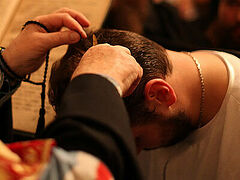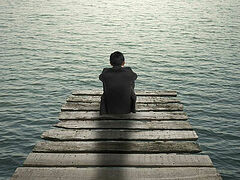Moscow, July 8, 2024
Last week, on July 3, 2024, a regional roundtable titled, “Replenishing the Monastery Brotherhood: What Does It Depend On?” took place at the Sretensky Stavropegial Monastery for Men in Moscow. The roundtable was attended by abbots and abbesses of stavropegial monasteries and monastic communities of the Moscow Metropolitanate. A report of the session was posted on Monastyrsky Vestnik, the website of the Synodal Department for Monasteries and Monasticism of the Moscow Patriarchate.
The presidium included the chairman of the Synodal Department for Monasteries and Monasticism, Metropolitan Theognost of Kashira, who is also the abbot of the Donskoy Stavropegial Monastery in Moscow; the Patriarchal Vicar of the Moscow Metropolis, Metropolitan Pavel of Krutitsy and Kolomna; the deputy chairman of the Synodal Department for Monasteries and Monasticism and abbess of the Stavropegial Conception Convent Moscow, Abbess Juliana (Kaleda); Bishop Alexiy of Solnechnogorsk, the abbot of the Danilov Stavropegial Monastery in Moscow; and Bishop Euthymius of Lukhovitsy, the abbot of the Vysoko-Petrovsky Stavropegial Monastery.
In his introductory speech addressed to the heads of monastic communities, Metropolitan Pavel of Krutitsy and Kolomna reminded those gathered that the primary condition for the replenishment of monasteries is love. The Christian attitude of the brethren towards each other and all who come to the monastery attracts people, he said. “If Christian love lives and acts in the monastery, then the monastery will be replenished. People quickly learn about such a monastery. A pious life is the best preaching of Christianity and monasticism.” Met. Pavel also noted that the personal example and prayers of the abbot or abbess, the cheerful disposition of the monastic community members, and spiritual guidance are significant conditions for the prosperous spiritual life of the monastery.
The first speaker was Bishop Alexy of Solnechnogorsk, the abbot of the Danilov Stavropegial Monastery for Men in Moscow. He titled his presentation with a quote from the Paschal Canon, “The beginning of another eternal life...” and emphasized the spiritual life in the monastery as the beginning of eternal life. He stated that those who seek eternal life in God here on earth and strive for spiritual success should come to the monastery. Although this ideal is not always achievable in reality, as Bishop Alexy pointed out, God sometimes reaches out to a person even in sin and downfall, literally pulling him out of a sinful abyss. The spiritual spark can sometimes ignite simply because a person feels blessed in the church or while visiting holy places. In any case, the abbot or abbess must handle the newly formed desire of the newcomer to be with God with great care, supporting this fervor and protecting them from the danger of spiritual delusion. Aside from the inspiring external aspect, the initial encounter with monasticism should provide a sense of inner spiritual fulfillment. Bishop Alexy stressed the importance of explaining the need for obedience, acceptance of God's will, non-judgment, and the elimination of evil thoughts, while emphasizing the significance of the probationary period for novices, providing them with support and guidance through love.
Bishop Joseph of Mozhaisk, the abbot of the Optina Stavropegial Monastery of the Entrance of the Theotokos into the Temple, discussed the reasons for the decline in the number of people wishing to join monasteries. He identified external factors such as unfavorable demographic situations in regions inhabited by Russian Orthodox people, and internal factors affecting modern individuals. Bishop Joseph highlighted the impact of mass culture over the past thirty years, which has fostered a consumer society, promoting selfishness, comfort, and a leisurely lifestyle, all contrary to Christian values. As a result, with 66 percent of the population now identifing as Orthodox Christians compared to 80 percent fourteen years ago, those promoting consumer society values are essentially enemies of the Church.
Regarding internal factors, Bishop Joseph emphasized the importance of spiritual guidance in the monastery and noted the atypical influx of people into monasteries in the 1990s, following the end of Church persecution. He suggested that today's situation is more typical, with no acute need for replenishing monastic communities in stavropegial monasteries, based on statistics presented by Patriarch Kirill.
Abbot Sergius (Kuksov), the abbot of the St. David-Holy Ascension David Monastery, shared insights on the motivations driving individuals to monastic life and how to support those who wish to remain in the monastery. He noted that over twelve years, more than 600 people had worked at the monastery, with varying motivations. He stressed the importance of fostering a spiritual community and cautioned against excessive physical labor, which can lead to burnout and spiritual decline.
Abbess Tamara (Goncharenko), the abbess of the Alexander Nevsky Monastery for Women, discussed the spiritual component as a factor in replenishing monastic communities, emphasizing the importance of divine calling, personal aspiration, and spiritual life in the monastery.
In her report, Abbess Alexia (Petrova), head of the Convent of the Entrance of the Theotokos into the Temple, discussed the monastic quest for divine beauty, comparing monastic virtues to the labor of bees. She emphasized the importance of first impressions and the structured prayer life in attracting and retaining new members in the monastery.
Metropolitan Pavel concluded the roundtable by underscoring the need for prayer and attention to personal piety, expressing gratitude to Patriarch Kirill for his blessings and to all participants for their engaged involvement.




